The University of Santo Tomas and the Association of Southeast and East Asian Catholic Colleges and Universities (ASEACU) co-organized a two-day webinar-workshop with the theme “Beyond the Pandemic: Best Practices towards Sustainable Development” on October 14-15, 2021 via Zoom.
Challenges and opportunities to Catholic higher educational institutions in the time of the COVID-19 pandemic
In her keynote lecture, Dr. Isabel Capeloa Gil, President of the International Federation of Catholic Universities, mentioned that the medical schools and research centers belonging to the Catholic institutions were working on a wide array of solutions to combat the COVID-19 pandemic. Despite the trials to global exchange, according to Gil, the networks and the global exchange models must still proceed.
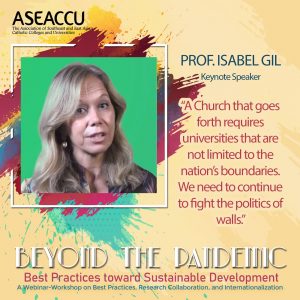
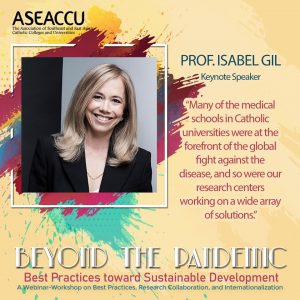
The educational institutions around the world have maximized the use of technology when the COVID-19 pandemic halted the face-to-face transactions. Likewise, Gil said the supplemental role of technology in the traditional in-person instruction will stay, thus underscoring the importance of embracing the new, ever-evolving, and innovative practices in teaching, which sprung from limitations of the COVID-19 pandemic.
“What started as a crisis is now paving way to a more nimble, flexible, and at times less formal instruction framework. We can see how our friends, students, and teachers live through their screens, perhaps enabling also new forms of sociality,” Gil said.
Moreover, Gil urged the Catholic universities to grab the opportunity to focus their strategies and development on impact-driven and socially sustainable goals. “The opportunity to renew traditional pedagogy and strengthen collaborative learning models must be embraced. An implementation of education-friendly technology affords inclusion and enhances cooperation,” Gil said.
Gil is currently the Rector of the Catholic University of Portugal (UCP) and the President of the International Federation of Catholic Universities. She is a full professor of Culture Studies at the UCP – School of Human Sciences.
Sharing the best practices during the pandemic
During the morning plenary sessions of day one, the speakers shared their respective institutions’ best practices during the health crisis, specifically pertaining to teaching and learning, wellness of stakeholders, and financial viability.
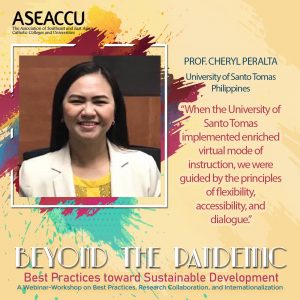
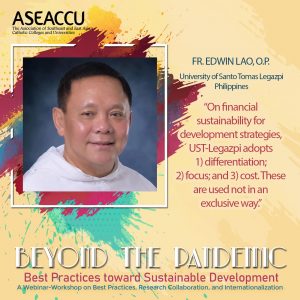
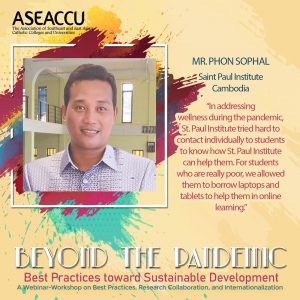
On behalf of the University, UST Vice-Rector for Academic Affairs Prof. Cheryl R. Peralta, DrPH, PTRP spoke about the University’s implementation of the enriched virtual mode of instruction (EVM) and how the principles of flexibility, accessibility, and dialogue guided the top university officials and administrators in creating decisions, which kept the Thomasian-brand of education living in these tumultuous times.
“At this time of pandemic, there is much value in cooperation, teamwork, and collaboration to achieve a common purpose. For a big and comprehensive institution like the University of Santo Tomas, synergy among its 22 degree-granting units is crucial for implementing plans and strategies to address concerns,” Peralta said.
On behalf St. Paul Institute-Cambodia, Director, Mr. Phon Sophal talked about ensuring the wellness of their stakeholders, as well as their institution’s charitable initiatives in providing their students with equipment. “In addressing wellness during the pandemic, St. Paul Institute tried hard to contact individually to students to know how St. Paul Institute can help them. For students who are really poor, we allowed them to borrow laptops and tablets to help them in online learning,” Sophal said.
Lastly, University of Santo Tomas – Legazpi, Philippines’s Vice-President for Finance and Administration, Fr. Edwin Lao, O.P., spoke about financial sustainability during the pandemic. “On financial sustainability for development strategies, UST-Legazpi adopts differentiation, focus, and cost. There are used not in an exclusive way,” fr. Lao said.
“We grounded these on the principles and values of fiscal discipline and excellence. There were arrived at by conscientiously applying the major functions of financial management and using the management tools of analysis,” fr. Lao said.
On research
In the afternoon plenary sessions, three scholars presented updates on their work to show how research has thrived even during the pandemic.
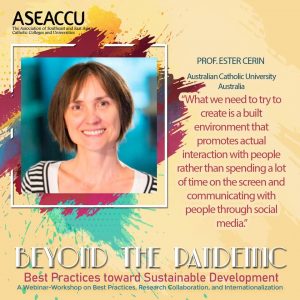
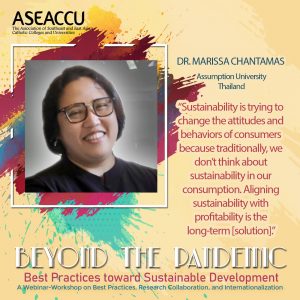
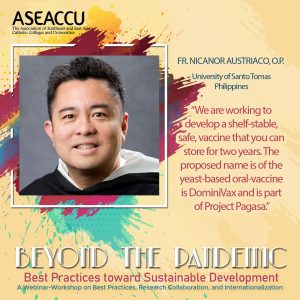
Australian Catholic University’s Professor Ester Cerin spoke lengthily about how the physical environment, especially in urban cities, impacted brain functioning and development. “What we need to try to create is a built environment that promotes actual interaction with people, rather than spending a lot of time on the screen and communicating with people through social media,” Cerin said.
“The more opportunities you have for things to do in the environment, the less likely you are to actually engage substantial screen time, which has a negative impact on health,” Cerin noted.
Assumption University’s Dean Marissa Chantamas emphasized the need for audiences to include sustainability as a factor in their consumption. “Sustainability is trying to change the attitudes and behaviors of consumers because traditionally we do not think about sustainability in our consumption. Aligning sustainability with profitability is the long-term [solution],” Chantamas said.
“Being caring to the environment, to society is part of the cost that they [companies] cannot cut. It is thus important for customers to support companies that are promoting sustainability. If we can do that, it’s a win-win for all,” Chantamas said.
UST Department of Biological Sciences Visiting Professor Rev. fr. Nicanor Pier Giorgio Austriaco, O.P., PhD, SThD noted the importance of getting vaccinated as a way to achieve herd immunity, leading to the end of the Covid-19 pandemic. “We have administered 6.6 billion Covid-19 vaccine doses to date. No other vaccine has been administered this much in history. Side effects are incredibly rare. The effectiveness of these vaccines substantially outweigh their risks,” fr. Austriaco said.
Moreover, he gave updates on the yeast-based oral Covid-19 vaccine currently being developed by UST researchers and scholars from the Providence College, USA.” We are working to develop a shelf-stable, safe vaccine that you can store for two years. The proposed name is of the yeast-based oral-vaccine is DominiVax and is part of Project Pagasa,” fr. Austriaco said.
Watch the Day 1 (October 14, 2021) of the ASEACU webinar: https://www.facebook.com/aseaccu2021/videos/398473655221624/
On internationalization
During the plenary sessions of day two, three internationalization experts from the Philippines, Australia, and Macau shared how internationalization can be done in different university contexts.
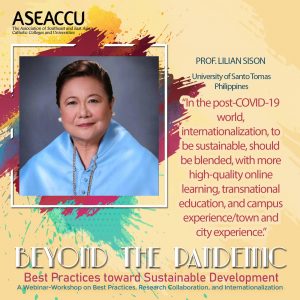
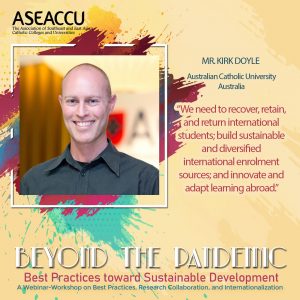
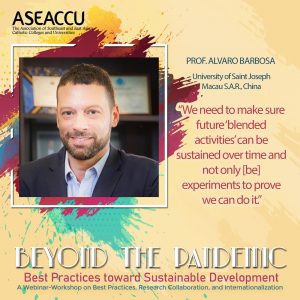
Director of the UST Office of International Relations and Programs Prof. Lilian Sison, PhD shared the importance of blending high-quality online learning to internationalization in the post-COVID-19 world. “Our primary purpose is to maintain active contact with key international partners to redesign cooperation for faculty and student exchanges, transnational education, and transnational research,” Sison said.
Meanwhile, Mr. Kirk Doyle of the Australian Catholic University said their institution will focus on injecting innovation into their approach, creating diversification in the breadth and quality of offerings, and as well as delivering an authentic digitalized global experience that moves beyond virtual replacements. “We need to recover, retain, and return international students; build sustainable and diversified international enrolment sources; and innovate and adapt learning abroad,” Doyle said.
Lastly, Prof. Alvaro Barbosa shared how small universities can be sustainable through internationalization and research initiatives. “At the heart of any change or transformation in the economy is education. The government [of Macau] realized that more investment was necessary for higher education,” Barbosa said.
“We need to make sure future blended activities can be sustained over time and not only [be] experiments to prove we can do it.” he said.
Capping the second day of the webinar, an exclusive workshop was held for the internationalization officials. The internationalization workshop was facilitated by Mr. Glen Chatelier, Director of the Assumption University – Bangkok, Thailand Office of International Affairs.
Watch the Day 2 (October 15, 2021) of the ASEACU webinar: https://www.facebook.com/aseaccu2021/videos/622794722434947/




